Artists, athletes, and even ... a security officer! Those who had nothing to lose looked for a better life in exile. But also people who lived like butter donuts under the popular regime. They spent months preparing to leave. However, fractions of a second decided whether they would manage to escape the watchful eye of the communist authorities.
Go to the West - millions of Poles dreamed about it during the People's Republic of Poland. The authorities, however, effectively impeded citizens from traveling freely.
Getting a passport, paying for a trip, collecting foreign currency - even such basic preparations constituted an insurmountable barrier for many. Not everyone managed to get to the desired place:the capitalist country. It is not surprising then that the lucky few often could not resist the temptation and gave up returning to Poland.
Willing to break free from the protective wings of the people's power was never lacking. Life in a foreign country has been chosen by many writers, artists and athletes, and even ... high-ranking government officials. Seemingly they belonged to a privileged group. They could count on better wages and larger apartments than most of their fellow citizens. They were also allowed to travel abroad from time to time… under certain conditions.
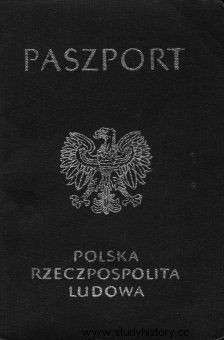
The mere acquisition of a passport in the People's Republic of Poland was often a miracle and was only the first step to prepare an escape abroad (the photo comes from the book "Escape at all costs. Famous refugees and emigrants from the People's Republic of Poland", Bellona 2017).
However, the indulgence of the authorities ended with the escape. Famous people who remained abroad were radically condemned by the press. The illegal immigrant was treated like a traitor . Rumors and slander were often spread about him.
How far can you get away from the military?
One of those who chose to live in exile was Marek Hłasko, the enfant terrible of contemporary Polish literature. He fled mainly from the army. If not for the prospect of two years in boots, perhaps he would never have decided to leave the country. He was doing quite well in People's Poland.
At the age of 24, after he made his debut with a collection of short stories "The First Step in the Clouds", he already had a loyal readership and was appreciated by older, more influential writers. The recognition of his work was confirmed by the prestigious Publishers Award, which he received in 1958. He also waited for his short story to be filmed and wrote for the "Po Prostu" weekly on request. He was said to be a pet of Jarosław Iwaszkiewicz.
The obligation to serve in the army meant the end of freedom for Hłaska, as for many young people around the world. And the forced distance from Warsaw streets, inferior pubs and working class neighborhoods. And yet it was in this environment that the young writer took a literary harvest. It was there that he found material to describe how "the working-class face of the city turns into a drunken muck" .
The decision to escape was finally made when the author of "The Eighth Day of the Week" was drafted into the army and the scholarship he had received in France was withdrawn. What was the departure of the legendary writer into emigration like? He describes his adventures in the book “To Escape at All Costs. Famous refugees and emigrants from the People's Republic of Poland ”Jarosław Molenda.
On February 21, 1958, Hłasko boarded a plane departing to Paris. He was issued a temporary visa by a French consul. The writer borrowed money for the trip from the American correspondent of the New York Times in Warsaw. Passport - an invaluable thing in the People's Republic of Poland - fortunately he had in his pocket. The young writer later described the moment that influenced his whole life in his autobiographical novel "Beautiful Twenty Years":
I had eight dollars with me; I was twenty-four; I was the author of a published volume of short stories and two books which I did not want to publish. I was also a laureate of the Publishers' Award, which I received a few weeks before I left Warsaw. And one more thing:I was declared a finished man and it was stated beyond any doubt that I would never write anything again.
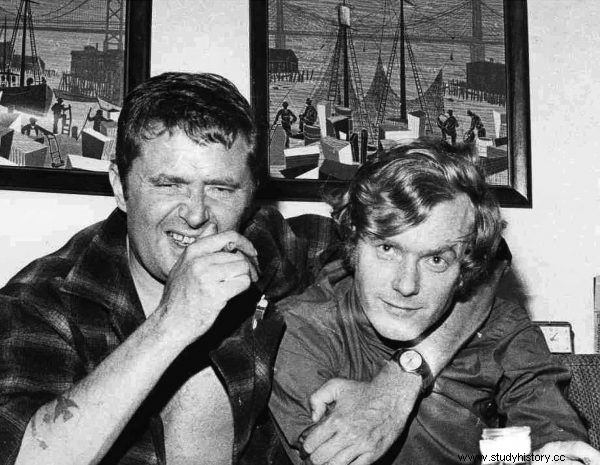
One of the famous Poles who decided to escape from the People's Republic of Poland was the writer Marek Hłasko, pictured with Krzysztof Komeda (the photo comes from the book "Escape at all costs. Famous refugees and emigrants from the People's Republic of Poland", Bellona 2017).
The beginnings of emigration of the rebellious "prodigy" of socialist literature were much easier than that of an anonymous stranger from a communist country. The famous writer could count on the support of the influential editor and publisher Jerzy Giedroyc. He has given interviews and his prose has been translated into several languages. Despite these facilities, outside of Poland, he could not find a place to live or a good material to describe.
Hłasko drank more and more and wrote worse and worse. He unsuccessfully tried to return to the country. However, the road was closed:he never returned to Poland. He wandered around the world, living in California, Israel, Switzerland and West Germany. One short night in June 1969, while he was in Wiesbaden, he might have drunk more than usual and swallowed sleeping pills. In the morning he was found dead. He was then 35 years old. Rumors spread in Poland that he committed suicide.
A well-composed escape
Andrzej Panufnik has adapted to his life in exile better than Hłasko. The outstanding composer was much older than the writer when he left the country. He was 40 years old.
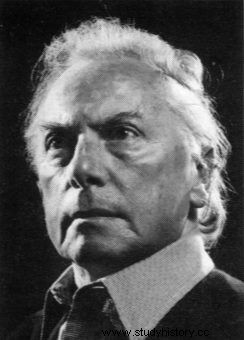
Composer Andrzej Panufnik, among others, had enough constant control by the apparatus of power (the photo comes from the book "Escape at all costs. Famous refugees and emigrants from the People's Republic of Poland", Bellona 2017).
It seemed that his life in People's Poland was exceptionally successful. At least as much as it was possible under conditions of real socialism. The musician has won many awards, including the highest state decoration, the Banner of Work of the 1st class. He was director of the Warsaw Philharmonic and vice-chairman of the UNESCO International Music Council. He could travel all over the world, and the Polish authorities treated him as an ambassador of Polish culture.
Panufnik, however, felt in control. He did not care about foreign delegations, he was often even forced into them. In addition, during his stay in China, the composer's several-month-old daughter died tragically. Additionally, it broke him. And finally, in 1954, he decided to leave Poland forever .
His wife was already in England. He himself, with the help of his friends, organized a trip to Zurich to record Polish music. In order not to arouse suspicions, an official invitation was sent to the Office for Cultural Cooperation with Foreign Countries. Panufnik pretended to be surprised by the proposal and at first even refused the director of the Bureau, who encouraged him to leave. He agreed, seemingly without enthusiasm, only after much persuasion.
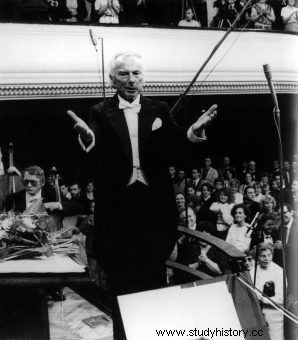
Panufnik decided to live in Great Britain (the photo comes from the book "Escape at all costs. Famous refugees and emigrants from the People's Republic of Poland", Bellona 2017).
When he left his Warsaw apartment, the musician knew that he would never return home. Out of caution, he only took one small suitcase with him. He threw scores, a baton and some clothes into it.
When he got to Switzerland, he still had to free himself from the intrusive company of officials of the Polish diplomatic mission. He did not want to go to the office of the legation, which, according to international law, is treated as the territory of the country he represents. Meanwhile, Polish diplomats from Berlin began to worry. The composer did not buy a return ticket to the country.
Panufnik decided to leave the hotel where he was staying as soon as possible and move to another hotel. As Molenda relates in the book “Zwać at all costs. Famous refugees and emigrants from the People's Republic of Poland ”, what followed resembled scenes from an action movie. The musician was escaping by taxi through the city. Right behind him were communist agents.

In Poland, the authorities banned playing Panufnik's works for many years. However, he was appreciated abroad - Queen Elizabeth II even granted him a knighthood (source:public domain).
Polish officials finally lost track of the composer. They sent a message to Warsaw about his disappearance. Panufnik, on the other hand, went from Switzerland to England. There he applied for asylum and spent the rest of his life. After his first marriage broke up, he remarried and started a new family. And how did the Polish authorities react to his escape? The composer was accused of stealing the money he had received for his stay in Switzerland . And he was also banned from playing his songs for many years.
From the security services to a free Europe
The escapes of famous artists were inconvenient for the authorities of the Polish People's Republic. However, they did not feel truly threatened until the unexpected disappearance of a high-ranking state official. Józef Light, deputy director of Department X of the Ministry of Public Security, was a particularly “dangerous” fugitive. Mainly because of the information he could pass on to foreign intelligence agents. As emphasized by Jakub Molenda in the book “To get away at any cost. Famous refugees and emigrants from the PRL ”:
Knew [on] about details of investigations and investigations, methods of assembling show trials and hooded courts, in the jargon of the Security Service, called ... toilet courts.
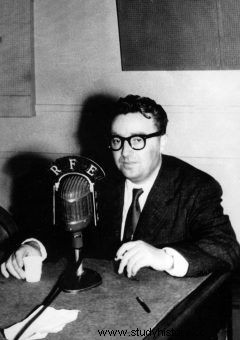
Józef Light, deputy director of Department X of the Ministry of Public Security, was a particularly "dangerous" fugitive (the photo comes from the book "Get away at all costs. Famous refugees and emigrants from the Polish People's Republic", Bellona 2017).
The communist dignitary ended his career in the communist regime in December 1953. He used an official visit to Berlin to move from the eastern part of the city to the west. The city was not yet divided by a wall, so the Light found its way to the American zone without much difficulty. There he revealed who he is.
Soon the head of the CIA issued an official announcement about the escape of Światła. In Poland, the media remained silent, but panic broke out among the ruling elite . Initially, it was speculated that maybe Light had been kidnapped. He was also accused of being an American agent. One thing was certain - as a high security officer he saw and knew a lot. And this knowledge could harm many Polish communists.

Józef Light not only escaped from the regime, but also was able to testify abroad what the government in the People's Republic of Poland looks like (the photo comes from the book "Get away at all costs. Famous refugees and emigrants from the People's Republic of Poland", Bellona 2017).
However, the real bomb did not go off until September 28, 1954. On that day, a program with Light was broadcast on Radio Free Europe. The former deputy director of the Ministry of Security began to reveal the secrets of the functioning of the regime in Poland. It turned out that the program will be broadcast periodically.
The content of the recordings shocked the Polish society and terrified the authorities. A detailed account of each program was handed over to Bierut. And how was the fate of Światła? In exile, he gained a new identity and appearance. He settled in the United States, where he died in 1994.
Win Freedom
Talented athletes were also looking for a better life outside the communist regime. For example, the escape of Tadeusz Teodorowicz was a great loss for Poland. This famous speedway rider represented Gwardia Gdynia and (later) Spójnia Wrocław. He won medals in the team and individual Polish championships.
Teodorowicz was allowed to compete in foreign races. Thanks to his trips, he earned very good money and at the same time made valuable contacts . While in England, he also had the opportunity to see what opportunities this country offers. It was not only about a better life and higher earnings, but also about more favorable conditions for the development of sports talent.
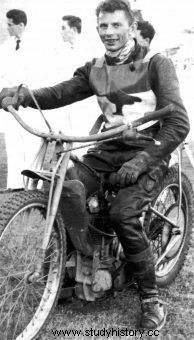
The talented speedway rider Tadeusz Teodorowicz had the opportunity to find out that life abroad is much better when he participated in competitions outside the country (the photo comes from the book "Leaving at all costs. Famous refugees and emigrants from the Polish People's Republic", Bellona 2017).
After making the decision to flee the country, the rider only had to wait for the right opportunity. She hit it off in August 1958, when he went with his club to the competition in the Netherlands. Disconnecting from the group was not easy. Speedway riders were very well guarded by a "guardian" from Poland, who was in fact an agent of the UB. However, Teodorowicz managed to escape his friends while going to the cinema to watch the movie "The Bridge on the River Kwai".
The athlete simply left the screening and went to a nearby police station, where he asked for asylum. Then he moved to England. He settled in the town of Swindon near London and ended up at a local speedway club. Unfortunately, his career in exile lasted only a few years. In September 1964, Teodorowicz was injured in an accident during a race. He died a few months later.
Emigration to a medal
The legendary Polish athlete Władysław Kozakiewicz also decided to flee the country in the declining period of the Polish People's Republic. This competitor from Gdynia has gone down in history not only because of his sports achievements. He is also remembered (or perhaps above all) because of the famous gesture directed at Soviet fans. They tried at all costs to make it difficult for Poles to start at the 1980 Olympics in Moscow. As Jacek Molenda writes:
When Poles jumped, fans stomped, whistled, screamed, threw various objects, they did everything to distract them.
At one point, a frustrated Polish pole vault showed them his clenched fist. This caused a real scandal in the socialist bloc. The Soviet ambassador intervened with Gierek in the Kozakiewicz case . He demanded an exemplary punishment of the athlete. The Pole was threatened with the loss of the medal and disqualification for life. The world record, which he broke in Moscow, was about to be annulled.

Kozakiewicz was not afraid to show his famous gesture, nor to fight for a better life by fleeing the country (the photo comes from the book "Escape at all costs. Famous refugees and emigrants from the Polish People's Republic", Bellona 2017).
Fortunately, the situation was somewhat alleviated. The Olympic medalist explained in interviews that he showed ... to the pole, not the fans. Thanks to this, his career did not end prematurely. Even so, he could not take part in the next Olympics, which was to be held in 1984 in Los Angeles. It was a political decision. No athlete from socialist countries went to see them.
Another blow for Kozakiewicz were the requirements of the Polish Athletics Association. The pole vigor was given the condition that he would be able to participate in the meetings ... on condition that he jumped to a height of 5.60 meters. It was a big challenge for the 32-year-old athlete who had just undergone surgery. So he concluded that the only way to save his career was to leave Poland.
In 1985, a pole vaulter took a ferry to Sweden with his wife and young children. From there they reached West Germany. In Germany, Kozakiewicz enjoyed sports triumphs for several more years. He even managed to improve Germany's pole vault result to 5.70 m . At the same time, slanders were spread in Poland that the Olympian-scandalist had escaped ... because of unpaid taxes.
Bibliography:
- Zbigniew Błażyński, This is Józef Light speaking. Behind the scenes of the Security Service 1940-1955 , Publishing House LTW 2012.
- Andrzej Czyżewski, A beautiful twenty-year-old. Marek Hłasko's biography , Prószyński i S-ka 2012.
- Filip Lech, (A) symmetries of the 20th century - who Panufnik was ?, Culture.pl 14/02/2014.
- Jarosław Molenda, To get away at any cost. Famous refugees and emigrants from the People's Republic of Poland , Bellona 2017.
